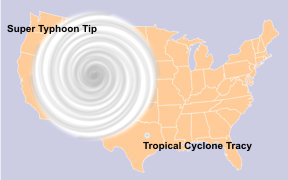From SA:
Tropical cyclones like Irene are predicted to be more powerful this year, thanks to natural conditions, but researchers disagree on how to rate that intensity*That first paragraph is flat out wrong.
Atmospheric researchers tend to agree that tropical cyclones of unusual ferocity are coming this century, but the strange fact is that there is no consensus to date on the five-point scale used to classify the power of these anticipated storms. In what may sound like a page from the script of the rock-band spoof Spinal Tap with its reference to a beyond-loud electric guitar amplifier volume 11, there is actually talk of adding a sixth level to the current Saffir-Simpson hurricane scale, on which category 5 intensity means sustained winds higher than 155 miles per hour (250 kilometers per hour) for at least one minute, with no speed cap.
The lack of an upper limit on the scale results in all of the most intense tropical cyclones getting lumped together, despite their wide range of power. Category 5 becomes less descriptive when it includes 2005's Emily, which reached peak wind speeds of 257.5 kph (160 mph) and six hours in category 5; the same year's Katrina which held peak wind velocity of 280 kph (175 mph) for 18 hours in the category; and 1980's Allen, churning with peak winds at 305 kph (190 mph) maintained for 72 hours in the highest category.
And now the ferocity forecast for the century adds to this classification problem. "The severe hurricanes might actually become worse. We may have to invent a category 6," says David Enfield, a senior scientist at the University of Miami and former physical oceanographer at the U.S. National Oceanic and Atmospheric Administration (NOAA). This new level wouldn't be an arbitrary relabeling. Global satellite data from the past 40 years indicate that the net destructive potential of hurricanes has increased, and the strongest hurricanes are becoming more common—especially in the Atlantic. This trend could be related to warmer seas or it could simply be history repeating itself. Data gathered earlier than the 1970s, although unreliable, show cycles of quiet decades followed by active ones. The quiet '60s, '70s and '80s ended in 1995, the year that brought Felix and Opal, among others, and resulted in $13 billion in damages and more than 100 deaths in the U.S.
The pros and cons of categories: Five or six?
The average difference between the current categories equals nearly 20 mph, so a category 6 label would likely be applied to hurricanes with sustained winds over (280 kph) 175 mph. The speed and destruction of hypothetical "category 6" storms is speculative, despite the hurricanes with winds at that level.
After all, meteorologists and climate researchers may not even choose a category 5 storm from the record books if asked to identify the most powerful tropical cyclone in history, because the Saffir–Simpson scale fixates on maximum wind speed lasting for at least one minute and disregards the many other large-scale components that factor into a storm's level of devastation. The whole index should be thrown out the hurricane-proof window, some say....MORE
No one knows what impact the currently observed warming will have on either the frequency or intensity of hurricanes. The third grade answer is that "Because hurricanes are heat engines they will be stronger".
A bit more sophisticated fourth grade answer might look at the Atlantic Multidecadal Oscillation.
Fifth grade would include the effects of wind shear. Moving on to sixth grade, you might look at whether less humid air coming off the Sahara would hinder development of any hurricanes.
There will be folks with agendas arguing every point.
Just so you know, cyclones can get very large. Here's [Super] Typhoon Tip from October 1979:
The relative sizes of the United States, Typhoon Tip and Cyclone Tracy (the largest and one of the smallest tropical cyclones recorded, respectively)
87 Worst Predictions of All Time
A re-post from November '07. A surprising number of them came via the pages of Scientific American.
[and Lord Kelvin seems a bit of a twit -ed]
Here are twenty. Prediction is hard.
From 2Spare.com:
"Stocks have reached what looks like a permanently high plateau."
Irving Fisher, economics professor at Yale University, 1929.
"In all likelihood world inflation is over."
International Monetary Fund Ceo, 1959.
"Read my lips: NO NEW TAXES."
George Bush, 1988.
"Capitalist production begets, with the inexorability of a law of nature, its own negation."
Karl Marx.
"The multitude of books is a great evil. There is no limit to this fever for writing; every one must be an author; some out of vanity, to acquire celebrity and raise up a name, others for the sake of mere gain."
Martin Luther, German Reformation leader, Table Talk, 1530s(?).
"... too far-fetched to be considered."
Editor of Scientific American, in a letter to Robert Goddard about Goddard's idea of a rocket-accelerated airplane bomb, 1940 (German V2 missiles came down on London 3 years later).
"That the automobile has practically reached the limit of its development is suggested by the fact that during the past year no improvements of a radical nature have been introduced."
Scientific American, Jan. 2 edition, 1909.
"It will be gone by June."
Variety, passing judgement on rock 'n roll in 1955....
and many more.
